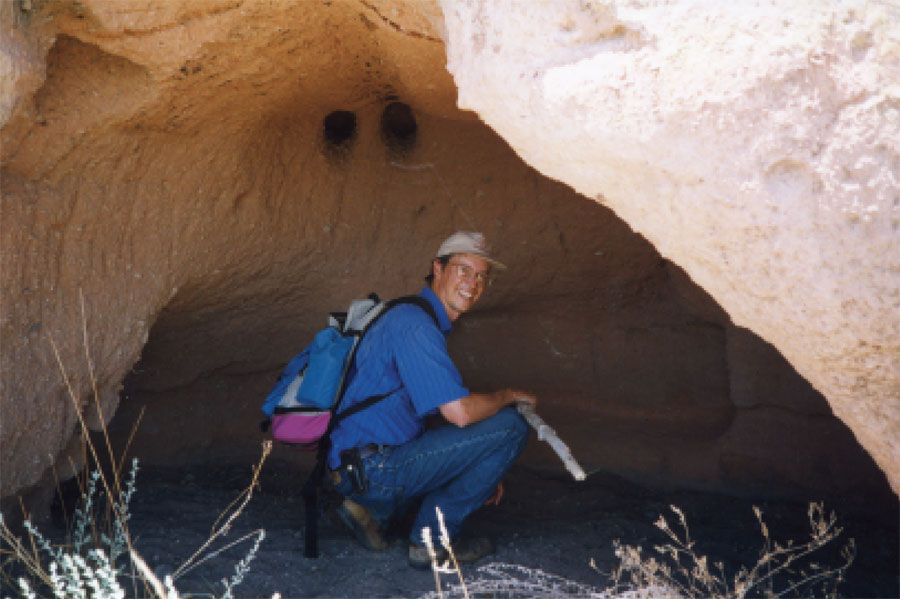
One of the many hats Robert W. Preucel wears as the Gregory Annenberg Weingarten Associate Curator of North America is Chair of the Museum’s Repatriation Committee. This committee is charged with implementing the Native American Graves Protection and Repatriation Act (NAG-PRA) passed by Congress in 1990. You may be familiar with this aspect of Preucel’s work because of an article he recently co-authored in Expedition (45(3):21-27), as well as a February 11, 2004, story in the Philadelphia Inquirer, “Gaining While Giving Up Artifacts.” When not engaged in NAGPRA work, Preucel focuses on ancestral Puebloan archaeological research; his interests also extend to archaeological theory and practice. He is a co-editor, with Ian Hodder, of the popular book Contemporary Archaeology in Theory.
A native Philadelphian, Preucel has been attracted to the study of Native North American cultures since his high school days, when he spent two spring vacations at Fort Defiance on the Navajo Reservation in Arizona with medical doctor Dr. Palmer Evans, who had been trained by Preucel’s father at Penn’s Medical School. During the summer of his senior year, he participated in John L. Cotter’s field school excavation of the Walnut Street Jail, a famous colonial debtors’ prison. These experiences led Preucel to enroll at Penn, where he majored in Anthropology, taking classes in both North American and Near Eastern Archaeology. Fittingly, his advisor was John Witthoft, whose job he now holds as Associate Professor of Anthropology and Associate Curator for North America.
Preucel attended the University of Chicago for his Master’s degree and specialized in Egyptology. His thesis analyzed the stylistic development of Egyptian cylinder seals. While at Chicago, he became increasingly interested in the “New Archaeology,” which seeks process-oriented explanations for culture change. For this reason, he decided to study for his Ph.D. at UCLA and joined the Pajarito Archaeological Research Project, New Mexico. His dissertation research, the first archaeological project to be funded by the American Indian Studies Center at UCLA, explored the changing relationships of agricultural field houses to Pueblo villages on the Pajarito Plateau (AD 1150-1550).
As post-doctoral visiting scholar at Southern Illinois University at Carbondale, Preucel organized a major conference on the processual/post-processual debate, which explored current issues of archaeological interpretation. Papers from that conference were later published in Processual and Postprocessual Archaeologies: Multiple Ways of Knowing the Past, edited by Preucel.
Robert Preucel left Carbondale in 1990 to join the faculty of the Department of Anthropology at Harvard University, where he also served as a curator at the Peabody Museum. During this phase of his career he became increasingly interested in philosophy, particularly in the writings of the U.S. pragmatic philosopher and seminal semiotician, Charles Sanders Peirce. While at Harvard, echoes of his long-ago high school experience in historical archaeology came full circle when Preucel co-directed an archaeological field school at Brook Farm, the famous Utopian community that claimed Nathaniel Hawthorne as a member.
Preucel accepted his current positions in Penn’s Department of Anthropology and at the Museum in 1995. Over the past seven years he has been collaborating with the members of today’s Cochiti Pueblo in the study of Kotyiti Pueblo, a prominent Post-Revolt village (see Expedition 42(1):8-17). With T. J. Ferguson and Matt Liebmann, he is currently researching the regional characteristics of the Revolt period settlement pattern. Some of this work is summarized in his edited book Archaeologies of the Pueblo Revolt: Identify, Leaning, and Renewal in the Pueblo World, which came out in 2002.
Robert Preucel is very involved in Native American issues on campus. He has organized lecture series and workshops, facilitated Native American visits to the Penn Museum, and is working closely with Acting Provost Peter Conn to recruit and retain Native American undergraduate students. He is also collaborating with students, faculty, staff, and alumni to create a Native American Studies Program.
Deborah I. Olszewski is a Lecturer in the University of Pennsylvania’s Anthropology Department and a Research Associate at the Museum.
